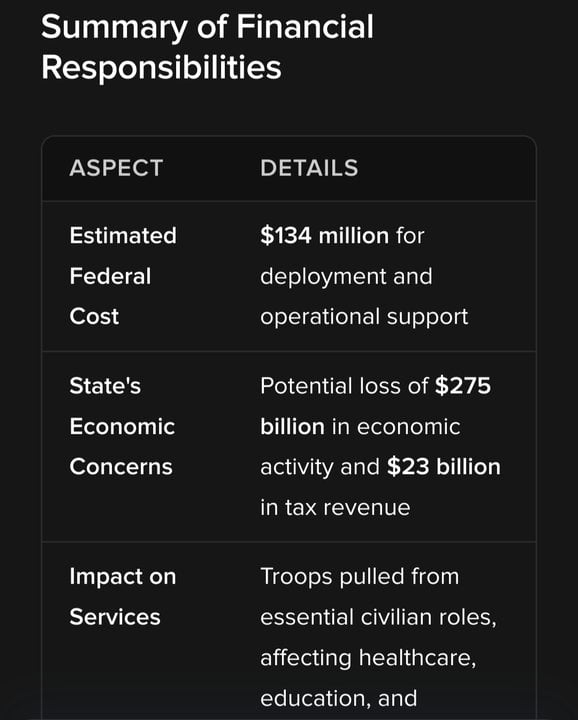This page is a permanent link to the reply below and its nested replies. See all post replies »
ElwoodBlues · M
I think in some form they will, but it won't be the way tRump wants it. I think the requirement that all law enforcement display faces and badges at all times interferes with tRump's brownshirt plans. But I think that as a sop to his ego, some members will be on the streets taking photo ops.
There's also a money issue here. Chicago has schools and many other expenses and can only allocate so much to the cops. In Wash DC, tRump is spending $1 million/day to keep 2000 Nat'l guard members there. I expect if Wash DC had an extra $1 million per day, they would probably appreciate it and could probably keep order better.
If tRump sends the Illinois guard to Chicago, I really wonder who will pay for it; that'll be the biggest question.
There's also a money issue here. Chicago has schools and many other expenses and can only allocate so much to the cops. In Wash DC, tRump is spending $1 million/day to keep 2000 Nat'l guard members there. I expect if Wash DC had an extra $1 million per day, they would probably appreciate it and could probably keep order better.
If tRump sends the Illinois guard to Chicago, I really wonder who will pay for it; that'll be the biggest question.
DeWayfarer · 61-69, M
@ElwoodBlues It will likely be something like California...
California's Financial Impact
While the federal government typically covers the costs associated with National Guard deployments, the state of California is concerned about the broader economic impact of these actions.
Here are some key points regarding California's financial responsibilities and the economic fallout:
State Budget Strain: Although the federal government is responsible for the deployment costs, the state has expressed concerns about the indirect financial burdens, such as the impact on local economies and essential services.
Economic Disruption: Reports indicate that the deployment has led to a 3.1% drop in private-sector attendance, comparable to the economic shock experienced during COVID-19 lockdowns. This decline affects businesses and tax revenues.
Long-term Economic Costs: The potential economic fallout from mass detentions and deportations linked to the deployment could cost California's economy $275 billion and reduce annual tax revenue by $23 billion.
Governor Newsom's administration is actively seeking to clarify these costs and their implications for California's budget and economy. The ongoing legal challenges and public discourse surrounding the deployment highlight the contentious nature of federal-state relations in this context.
While the federal government typically covers the costs associated with National Guard deployments, the state of California is concerned about the broader economic impact of these actions.
Here are some key points regarding California's financial responsibilities and the economic fallout:
State Budget Strain: Although the federal government is responsible for the deployment costs, the state has expressed concerns about the indirect financial burdens, such as the impact on local economies and essential services.
Economic Disruption: Reports indicate that the deployment has led to a 3.1% drop in private-sector attendance, comparable to the economic shock experienced during COVID-19 lockdowns. This decline affects businesses and tax revenues.
Long-term Economic Costs: The potential economic fallout from mass detentions and deportations linked to the deployment could cost California's economy $275 billion and reduce annual tax revenue by $23 billion.
Governor Newsom's administration is actively seeking to clarify these costs and their implications for California's budget and economy. The ongoing legal challenges and public discourse surrounding the deployment highlight the contentious nature of federal-state relations in this context.
sunsporter1649 · 70-79, M
@ElwoodBlues The same people that have had to pay for over 400 funerals this year









